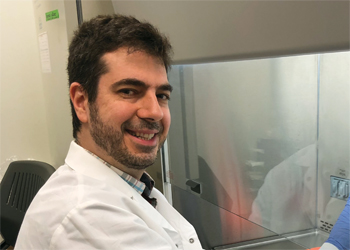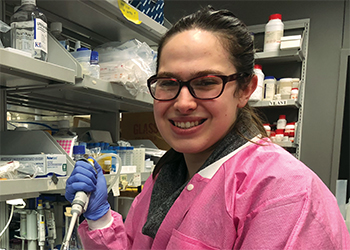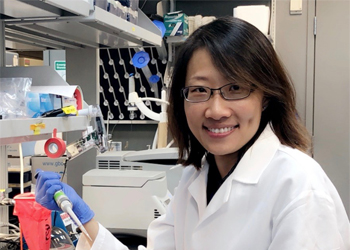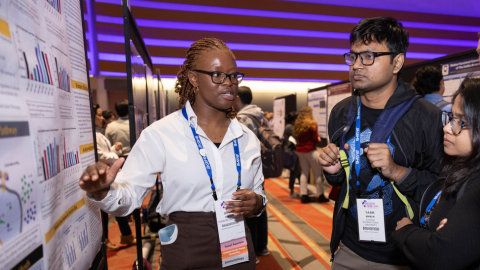Looking back at the journey
Every educational step beyond high school involves big choices. When making major life decisions, I often ask people with ambitions similar to mine who are further along in their journeys about their experiences.
I recently asked three trainees in the Laboratory of Neurogenetics in the National Institute on Aging at the National Institutes of Health about their education and career paths so far. I am an aspiring physician-scientist and soon will start my doctoral studies at the University of Oxford. I thought I might gain a better perspective on the graduate school experience from these three individuals, two of whom studied outside the U.S. Additionally, their viewpoints may be helpful for anyone interested in a postdoc position within the intramural side of the NIH.
Adamantios Mamais earned a Ph.D. at University College London, and Melissa Mazza earned a Ph.D. in behavioral neuroscience from Binghamton University; both are postdoctoral fellows. Ruth Chia did graduate research at University College London and is now a senior research fellow. Their answers have been edited.
 “Sometimes we work on something so specialized and narrow that our work doesn’t make for a good pub talk. Even so, developing your Western blot on a Friday night when everybody’s gone and realizing that you are the first person on Earth to see that protein A interacts with protein B — the first person to see a miniscule but real and important event in nature — it’s magical.”
“Sometimes we work on something so specialized and narrow that our work doesn’t make for a good pub talk. Even so, developing your Western blot on a Friday night when everybody’s gone and realizing that you are the first person on Earth to see that protein A interacts with protein B — the first person to see a miniscule but real and important event in nature — it’s magical.”
Adamantios Mamais, postdoctoral fellow
What’s the most important advice you wish you had received about graduate school?
Mamais: Be brave. Reach out to big names in the field and ask for their advice on your career path. You’ll find that, in most cases, people are very willing to listen to you and offer their expertise.
Mazza: Make sure the lab you join is a good fit. It’s important to feel compatible with the lab’s methodology, subject matter and social environment. Working well with your lab mates and getting along with your advisor will help you have a positive graduate school experience.
Chia: I’ve heard horror stories of how some graduate students struggle to get the support they need to be successful. Choosing a good graduate mentor is far more important than selecting a mentor based solely on how famous they are in a particular research field. Based on my experience interacting with numerous graduate students, prospective students need to be clear about why they are pursuing a graduate degree. Not every scientific career requires a Ph.D. If your target career does not, then perhaps graduate school is not the right path. I also wish I had known earlier in my research career that having a Ph.D. does not mean you are destined for the traditional academia route — and that’s OK.
How was the transition from undergraduate studies to graduate school?
Mamais: When I graduated with my bachelor’s degree, I had a rough idea that in five years I wanted to be completing a Ph.D. in molecular biology. I thought I needed more lab experience to be ready for a Ph.D. program, and a research assistant placement gave me confidence. My advice: Get to know and really explore your choices, and get to know yourself and what you want to achieve.
Mazza: My transition to graduate school was rough, mostly because I didn’t have lab experience. I was a psychology major. I didn’t know what a Western blot was and had never touched a rat. I was unaware of the time commitment that research demanded on top of classes and teaching responsibilities. It took about a year to learn what was required of me and how to best manage my time.
Chia: My transition was rather seamless. I had already learned that research was not a five-days-a-week, 9-to-5 profession. My earlier research experiences helped me prepare mentally for graduate school and taught me how to think creatively and be comfortable asking questions.
Did graduate school meet your expectations?
Mamais: Graduate school was super fun, challenging and rewarding. In the first couple of years, you realize that what sounded like a great research idea may be more complicated than you initially thought; you spend a long time making the tools or collecting the resources you’ll need to start testing your hypotheses. Most of your quality data probably come after a lot of trial and error and painstaking analysis. You navigate the hard times by talking to people, keeping an open mind and keeping up with the literature and current events in your field, all while trying not to lose focus on the project. Soon enough, you realize that you’ve gone so deep that you are the expert. This is both scary and freeing.
Mazza: I spent my first year in a lab that was not a good fit, but then I transitioned into another lab and my time became more positive. I experienced achievements and failures that pushed me to learn how much I am capable of. One of the most soul-crushing times was the preliminary exams after completing my master’s degree. I had to do a lot of work on my own, but once it was done, I realized I was able to teach myself something new. My time in graduate school taught me how little I know and to take pride in what I can accomplish.
Chia: Graduate school met my expectations. I knew it would be a challenge and require a monumental amount of dedication, both in time and stamina.
 “My transition to graduate school was rough, mostly because I didn’t have lab experience. I was a psychology major. I didn’t know what a Western blot was and had never touched a rat … It took about a year to learn what was required of me and how to best manage my time.”
“My transition to graduate school was rough, mostly because I didn’t have lab experience. I was a psychology major. I didn’t know what a Western blot was and had never touched a rat … It took about a year to learn what was required of me and how to best manage my time.”
Melissa Mazza, postdoctoral fellow
What’s it like to be a postdoc? What does your typical day look like?
Mamais: As a postdoc, you have the chance to develop professionally in a safe and nurturing environment. It can be the perfect balance of freedom to pursue your passion while feeling OK with having to seek advice. This is the time to take on new responsibilities, push yourself to try new techniques and explore different fields. You can apply for grants, present talks at conferences, start new collaborations, and even supervise and train students. The hardest thing to master is a work-life balance.
Every day is a work day. A typical day is coming into work with a plan to do two experiments, the first one starting with the cells you plated the day before. You start your day by adding the treatment onto the cells and rush to a lab meeting where a person from your group presents for 45 minutes and you all offer critique on the data and propose future directions. Following that, you rush to the tissue culture room and start collecting and processing your cells. You remember you booked the afternoon slot for the confocal microscope, so you grab a 20-minute lunch and turn on the microscope so the lasers warm up. Cells are now in the centrifuge, lunch is done, and you’ve started looking down the microscope while trying to reply to your emails and analyze the data you got two days ago that you didn’t have time to look at yet. Finally you have some quiet time at the confocal and you’re taking some beautiful images for analysis. When that’s done, you rush back to the cells you treated this morning so you don’t have to stay too late.
Sometimes we work on something so specialized and narrow that our work doesn’t make for a good pub talk. Even so, developing your Western blot on a Friday night when everybody’s gone and realizing that you are the first person on Earth to see that protein A interacts with protein B — the first person to see a miniscule but real and important event in nature — it’s magical.
Mazza: There is no typical day. My schedule is dictated by experiments: I could be at the bench doing wet lab work, with the mice running behavioral tests, or in the rare down time at my desk catching up on reading and writing. Being at the NIH, I have a lot of freedom to explore my scientific interests without the pressure of writing grants. While this allows for great scientific growth and the chance to do high-risk, high-reward experiments, it requires drive and motivation to gain the grant-writing experience that’s so valuable after a postdoc. As a postdoc in the intramural side of the NIH, my research is funded internally. Some internal grants do exist for postdoc trainees, but to gain grant-writing experience, we must reach out for opportunities external to the NIH, such as foundations. The NIH also offers a wide variety of workshops and seminars to help with improving grant-writing skills, and these can be helpful for learning the basics.
 “I’ve heard horror stories of how some graduate students struggle to get the support they need to be successful. Choosing a good graduate mentor is far more important than selecting a mentor based solely on how famous they are in a particular research field.”
“I’ve heard horror stories of how some graduate students struggle to get the support they need to be successful. Choosing a good graduate mentor is far more important than selecting a mentor based solely on how famous they are in a particular research field.”
Ruth Chia, senior research fellow
Chia: As an undergrad and grad student, I studied human genetics, disease modeling in mice and protein biochemistry. My postdoc focus was cellular biology of Parkinson’s disease and amyotrophic lateral sclerosis using high-throughput and gene-silencing approaches to delineate the pathogenic disease mechanisms. Now, as a senior research fellow, I manage and analyze big data generated from human genetic studies using bioinformatics tools and write my own computational scripts to perform analyses to answer the hypothesis at hand. It has been a satisfying journey.
My typical day starts the day before. I am a planner, and I perform best what I know what I need to do ahead of time. There are days where I need to multitask and perform different assays for different projects in one day. Planning helps me manage my time and focus.
A postdoc can explore research interests and determine the career path they want to carve. Within a supportive research environment, and perhaps with a little serendipity in science, a postdoc can make a successful transition to becoming a PI with a laboratory in an academic setting.
Next steps: Adam Mamais plans to enter academia, where he can have his own lab and teach; Melissa Mazza will apply for a K99/R00 award in hopes of facilitating a tenure-track position in academia; and Ruth Chia plans to continue in her new role as a staff scientist at the NIH.
Enjoy reading ASBMB Today?
Become a member to receive the print edition four times a year and the digital edition monthly.
Learn moreFeatured jobs
from the ASBMB career center
Get the latest from ASBMB Today
Enter your email address, and we’ll send you a weekly email with recent articles, interviews and more.
Latest in Careers
Careers highlights or most popular articles

Upcoming opportunities
Wrap up #ASBMB25 in style! Join us for a closing reception at the Griffin Museum of Science and Industry.

Chicago’s scientific interface
Experience the iconic Griffin Museum of Science and Industry at the ASBMB 2025 Annual Meeting closing reception, where history, innovation and hands-on discovery come together. Network, explore unique exhibits and celebrate scientific progress.

Upcoming opportunities
Register for ASBMB's webinar on cloud AI systems for biomedical research optimization and bias mitigation. Plus: Submit an abstract and register — at the early rate — for ASBMB's meeting on ferroptosis by March 12!

Black excellence in biotech: Shaping the future of an industry
This Black History Month, we highlight the impact of DEI initiatives, trailblazing scientists and industry leaders working to create a more inclusive and scientific community. Discover how you can be part of the movement.

Upcoming opportunities
Shape tomorrow's science at the ASBMB Annual Meeting! Save when you register by March 1.

Attend ASBMB’s career and education fair
Attending the ASBMB career and education fair is a great way to explore new opportunities, make valuable connections and gain insights into potential career paths.

